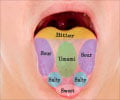Penguins do not have sense of taste as they have lost three of the five basic tastes over evolutionary time, and cannot detect the taste of fish or sweetness of fruit that they eat.

The researchers suggest that genes encoding those taste receptors may have been lost in penguins not because they weren't useful, but rather because of the extremely cold environments in which penguins live. (While some penguins have since moved to warmer climes, all penguins trace their roots to Antarctica.)
Unlike receptors for sour and salty, the taste receptors required for detecting sweet, umami, and bitter tastes are temperature sensitive. They don't work when they get really cold anyway. In other words, even if penguins had those taste receptors, the receptors wouldn't be much use to many of them.
Penguin tongues are also unusual in other ways, the researchers note. Anatomical studies have suggested that some penguins lack taste buds, the primary location for taste receptors, altogether. Their tongues are instead covered with stiff, sharp papillae covered by a thick, horny layer. It seems that penguin tongues are used not so much to taste food, but rather to catch and hold onto it.
Penguins also have a habit of swallowing their food whole, which might leave them less concerned about what their food actually tastes like or it might be the other way around.
The study is published in the Cell Press journal Current Biology.
Advertisement









